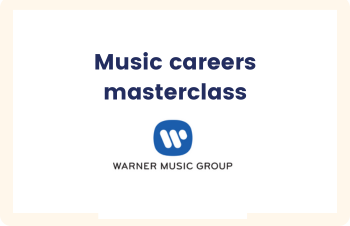In our latest masterclass, we were joined by a panel of three talented writers from our own alumni community who have pursued different types of careers across the creative industries. From journalists to screenwriters to novelists and copywriters for advertising campaigns, here’s what they had to say about navigating a writing career and finding your voice…
The panel:
- Aniefiok ‘Neef’ Ekpoudom, a freelance writer & storyteller who has just released his first book, ‘Where We Come From: Rap, Home and Hope in Modern Britain’
- Isabella Silvers, a freelance lifestyle journalist who has written for the likes of Cosmo, Elle, Women’s Health and Digital Spy
- Katrina Smith-Jackson, screenwriter and lecturer, who has written for Hollyoaks and Waterloo Road and is also part of the Regional Breakthrough Writers programme
How do you find potential writing opportunities?
“Be discerning and set intention about what kind of writer you want to be” – Neef
Izzy who, alongside freelance writing, writes her own newsletter Mixed Messages, emphasised that you have to be proactive: “You need to actively put yourself in those places”. You can use social media to your advantage and join Facebook groups such as No. 1 Female Media Women and Lightbulb; follow commissioning editors on X (formerly Twitter) and Instagram; sign up to Sian Meades’ & Jem Collins newsletters; and use platforms like JournoResources. Following on from this, Izzy said “I post a lot about what I’m doing because you never know who’s looking.” But her top piece of advice? “Aim for rejection – if you aim for one ‘no’ a week, at least you’re putting yourself out there, and one day that ‘no’ will be a ‘yes’.”
For Neef, it’s all about being intentional from the outset. He told our audience to think about: What kind of opportunities do you want? What are you looking to write about and where do you want to write it, and what style do you want to write it in? What editors and places can help you best communicate what you want to write? He recommends checking out the landscape first and to read *a lot* to “find the places your work can exist in”.
Neef also told our audience: “Don’t be afraid to be annoying! I emailed The Guardian every week to follow up on a pitch and about 3 months later, an opportunity to interview came about from it. It’s never personal if someone hasn’t responded right away, they’ve probably just received 100 emails that day. So be persistent”. This persistence is vital and Neef also recommends emailing your favourite writers to ask them for advice on landing a piece; they might even introduce you to the editor!
As a scriptwriter, Katrina mainly finds her opportunities through her agent, but prior to that she echoes Izzy’s recommendation of being active on social media. She often finds opportunities via WhatsApp groups like Black Women in Scripted and the Creative Access TV groups, and especially on X (formerly Twitter),but, she said, you have to be following the right people! Because so much of the industry and finding work is from word of mouth, Katrina explained it’s vital to make short films or web series to get your name out there: “It’s about connections. When people know your name, they’re going to bring it into the room”.
On freelancing
“Be annoying, chase up and follow up on all the recent connections you’ve made and see what projects they’re working on and if they have any work going.” – Katrina
We all know that freelancing right now is especially tough, however within the media, TV and writing industries freelancing is a career choice that you often can’t escape. And while our panel have varying levels of experience in full-time freelancing, they have all been doing it long enough to have picked up some valuable tips for others as they navigate the world of self-employment.
Izzy is a full-time freelancer as of six weeks ago, having worked in branded content at Hearst for eight years alongside freelance journalism. Branded content wasn’t the route she thought her career was going to take, she knew that she’d be working with the editors at Hearst Magazines such as Cosmo and Elle and her attitude was to “take the opportunity as you never know what you’re going to get”. She did her job part-time alongside freelance journalism to satisfy her creative side and explains that going full-time freelance wasn’t like “jumping off a cliff” because she’s been planning it for two and a half years.
Whilst Izzy planned her jump, Neef decided to go freelance on a whim. However, he did advise that people should analyse their situation and see what needs to be covered first; for him he was living at home and was able to take the risk. “It’s difficult to make all of your money just via journalism”, Neef said and explained that he does a lot of work to supplement the book writing and his journalism, such as working with agencies writing on campaigns for the likes of Nike and Adidas. He shouts out his Creative Access internship at The Marketing Store for introducing him to agency land. He continued, “Doing other work gives me the freedom to write what I want to write about rather than having to write about everything anything”.
With this, Neef suggested: “Don’t feel like all your income has to come from freelance writing, often it involves doing other work on the side.” Our panel wanted to reassure aspiring writers that lots of people do work that’s completely unrelated to writing to supplement their creative work and that it’s important to keep hold of your dream and your reasons for writing.
Katrina continued the conversation by telling our audience: “We all have rent and bills to pay” so it’s best to get prepared before you make the jump She said that while you’re never ready, you can assess your situation, which may involve working a salaried job and saving a few years to get into the right financial position to make the leap. This financial cushion can also prepare you for low commissioning months. Katrina also emphasised that you have to remember why you’re pursuing writing as a career; “always hold on to why you’re doing what you’re doing, I know there’s nothing else I’d rather do than writing.”
How to stay motivated
“Find your people who can be there for you” – Izzy
On the theme of staying motivated, our panel had some incredible practical advice on structures and routines that keep them going. Having reached out to the author Paul Canter for advice, Neef was told take time out of his day and copy inspiring writing into a word document. He explained that this process “gets you used to technical details that you’ll almost absorb the practices through osmosis”. And the proof that it improves your writing is there: “I did this every day and within 6 months, my writing shot up to a different level. This helps a lot with writer’s block; once you get into a routine with writing it almost becomes like a faucet of a tap that you can turn on and off.”
Katrina suggested that you need to find out how you work best whether that’s your work environment or the time of day where you produce your best work. For her, distractions become too much in her flat, so she heads to her local library. For other people it might be a cafe or working with a friend. She also made clear the importance of a balance between ‘work and play’: “If I work on a script all week, I’ll be miserable. I have to find time to see a friend for lunch or go to the cinema.”
For Izzy, staying motivated is all about having a clear vision with good people around you to pick you up when rejections happen. She says that she can visualise her book on the shelves of Waterstones and has broken down the steps she needs to get there. In moments of feeling frustrated that things aren’t moving quickly enough in your career, she recommended that the audience “keep hold of any moments of praise and be proud of yourself, even just by going to events like this, you’re taking more steps than others might.”
For even more pearls of wisdom from our panel, watch the masterclass in full:
Thanks so much to Izzy, Neef and Katrina for joining us and sharing their stellar advice and a big thanks also to our audience for being so engaged and asking brilliant questions! Keep your eyes peeled on our opportunities board for our next masterclass.




